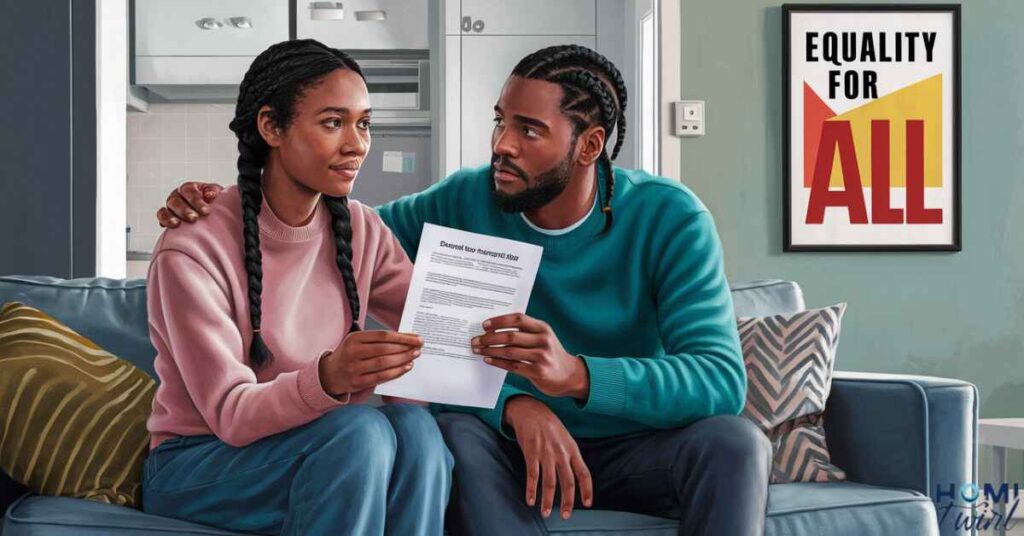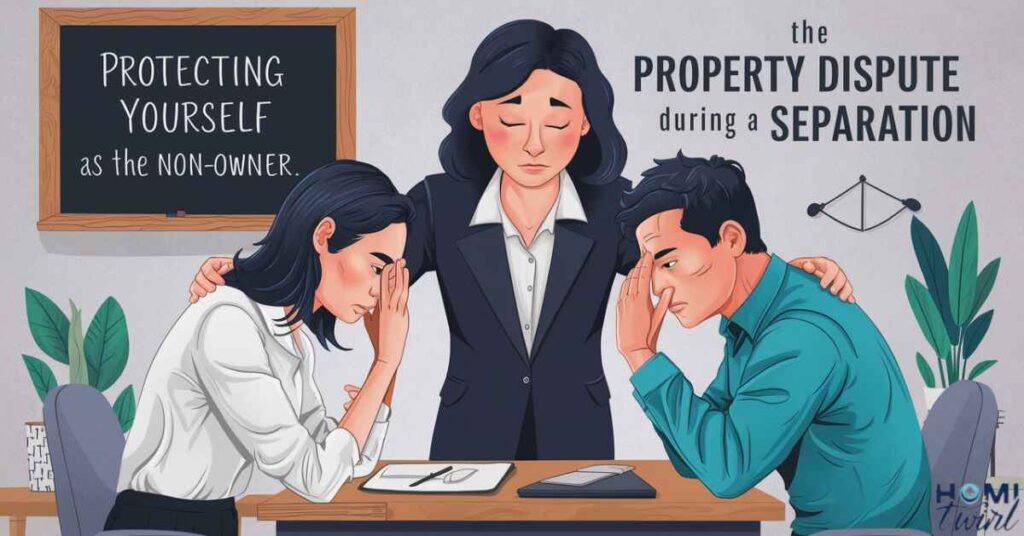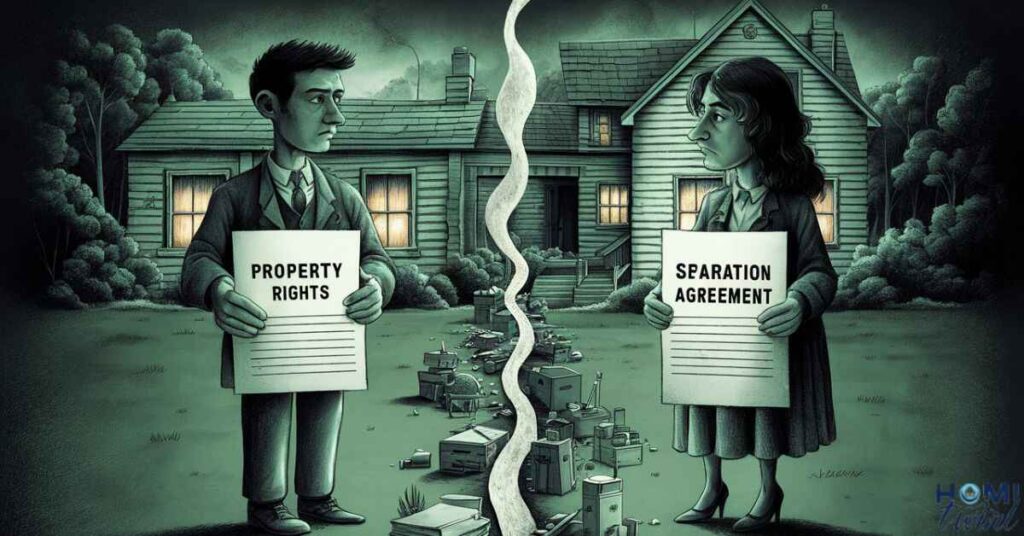Living with a romantic partner, sharing a life together under the same roof, is a major milestone. However, when only one person owns the home, it can raise complicated questions about legal rights and financial obligations. What claims might you have to the property you’ve also called home? The answer depends heavily on your specific circumstances and location.
While marriage generally confers more automatic property rights, unmarried cohabitating partners shouldn’t assume they have no legal standing. Through various provisions, you may be able to assert a claim to your shared home’s equity or value.
The path looks different in the USA compared to the UK, but in both cases, the best approach is to understand your options and take proactive protective steps.
Rights for Unmarried Cohabiting Partners

In most U.S. states and in the UK, unmarried couples have fewer automatic property rights compared to married spouses. As a non-owner, you don’t simply gain a stake in the home’s ownership through cohabitation alone.
However, that doesn’t mean your interests are completely unprotected. Depending on where you live, you may be able to make a legal claim to your share of the property’s value or stake through provisions such as.
Read This Blog: HOW TO ADD CABINET DOORS
Joint Investment and Contributions
If you’ve invested money, labor, or other resources directly into the home (e.g. renovation costs, mortgage payments, etc.), you may be able to argue for an equitable interest in the property proportional to your contributions.
Oral or Implied Agreements
Some areas recognize oral cohabitation contracts or implied agreements based on the conduct and statements between partners. For example, if there was a clear mutual understanding that you would gain an ownership interest.
Common Law Marriage
In a handful of U.S. states and some other countries that still recognize common law marriages, longterm, unmarried cohabiting partners may be viewed as having spousal rights after meeting certain criteria.
Child Custody Considerations
When children are involved, courts aim to avoid disrupting living situations unnecessarily. So a non-owner parent may gain temporary rights to remain in the family home based on the child’s best interests.
The strength and applicability of these provisions can vary significantly from one state/country to the next. An experienced family law attorney in your area can advise which legal theories might apply in your case.
The Difference Marriage Makes
In most places, being a married partner immediately grants you more defined legal rights and claims to residential property, regardless of whose name is on the ownership papers. Some common examples.
- Tenancy by the Entirety – In many U.S. states, this form of joint ownership gives both spouses equal rights and interests.
- Inheritance Rights – Married partners typically have inheritance rights that allow them to retain the family home if their spouse passes away.
- Decision-Making Authority – As a married spouse, you generally have more say in decisions like selling or mortgaging the home.
However, the specific property laws governing married couples vary considerably between different U.S. states and other countries. Some locations have “common law property” systems that split all jointly-acquired assets 50/50 in a divorce. Others are “equitable distribution” states where assets get divided up more situationally based on various factors.
In the UK, matrimonial property rights are a bit more nuanced. Spouses don’t automatically gain a share of ownership, but can make legal claims to the property’s value or financial interest based on factors like welfare needs and financial contributions during the marriage.
Resolving Property Disputes When Separating

What happens if a cohabiting or married couple breaks up, and there’s disagreement over how to handle the shared home and residential property? There are a few potential pathways:
Non-Confrontational Options
- Mediation – With help from an impartial mediator, the couple negotiates their property settlement privately outside court.
- Collaborative Divorce – Each partner hires a collaborative attorney without going to court, with an aim of reaching a mutually agreeable solution.
Court-Involved Legal Actions
- Partition Action – One partner essentially forces a sale of the co-owned property through the courts, so the parties can split the equity proceeds.
- Constructive Trust Claim – For unmarried partners, this legal claim aims to assert your financial interest in the home’s title/equity based on your monetary/non-monetary contributions during the relationship.
In partition, trust claim, or divorce proceedings, partners have to effectively prove their financial and/or non-financial investments and contributions to the property over time. Testimony, documentation of payments/labor, photos, and other evidence can all help demonstrate one’s “stake” in the home.
Also Read This Blog: HOW MUCH SPACE BETWEEN COUNTER AND UPPER CABINETS
Real-World Examples
My ex and I bought the house jointly, but only his name was on the deed since my credit was bad. After we split up, I successfully filed for partition and the court ordered the property be sold so we could divide the equity 50/50 since we had made all mortgage payments from our joint account. – Jessica D.
Things got ugly when my partner of 16 years decided to kick me out after our break-up, despite my having paid 60% of the down payment. Thankfully, my lawyer was able to negotiate a settlement where I recouped my down payment contribution from his equity in the property.” – Jared K.
As these cases show, the appropriate resolution can vary drastically based on factors like marital status, location-specific property laws, and the circumstances of investment and ownership. Getting experienced legal and financial guidance is highly advisable.
Protecting Yourself as the Non-Owner

If you’re planning to move into a property solely owned by your partner, it’s wise to take some proactive steps to protect your rights and interests from the outset.
Cohabitation Property Agreement
Regarded as the ”Living Together” version of a prenup, a cohabitation agreement is a legally-binding contract that stipulates upfront how you and your partner will handle the property, assets, support obligations and more in the event you separate later. If drafted properly with an attorney, it can be invaluable for defining your property claims.
Establish a Paper Trail of Investment
Even without a formal agreement, systematically documenting any funds, labor or other resources you pour into maintaining or improving the home can substantiate your financial interest. Contribute money directly toward mortgage payments from your own separate account.
Consider Other Forms of Joint Ownership
If your name isn’t already on the deed, you and your partner may look into adding you as a joint tenant to share equal ownership rights. Or a quitclaim deed which allows your partner to transfer a share of the interest to you. Just be mindful that these actions can trigger tax and legal implications to discuss with a professional.
The key is to be proactive from the very beginning. Make your intentions clear about wanting to establish a legitimate stake and interest in the property. Don’t just tacitly accept being solely a residential guest with no ownership rights.
Talk to Woolley & Co Solicitors about cohabitation and the family home
At Woolley & Co family law solicitors, we have vast experience advising both married and unmarried couples on all aspects of cohabitation and property ownership rights.
Whether you need to.
- Draft a cohabitation agreement upfront
- Take steps to protect your interests in the home
- Assert a financial claim after separating
- Or understand the implications of marriage
Our caring family lawyers offer confidential consultations to discuss your specific circumstances and goals. We aim to help you secure your rights while avoiding unnecessary conflict.
H3: Get confidential legal advice today
H4: How we help.
Here are some additional sections that could be included in the blog post.
What Are Your Rights to the Property If You Separate?

If you and your partner separate, your rights to the property you’ve been living in will depend on several factors.
- Marital Status: If you are married, you generally have more rights to a share of the property value or to remain in the home, especially if children are involved. If unmarried, your claims are more limited.
- Financial Contributions: Any mortgage payments, down payments, renovation costs or other money you put into the property can help establish an ownership interest.
- Non-Financial Contributions: Courts may consider non-monetary contributions like childcare duties that allow your partner to acquire/maintain the property.
- Location-Specific Laws: State/country laws dictate precise rights for divorcing spouses versus separating unmarried couples.
- Existing Agreements: A prenuptial, postnuptial or cohabitation agreement defining property interests is legally binding.
Upon separation, options to pursue your share may include.
- Negotiation/Mediation of a settlement.
- Partition Action to force sale of the home and division of proceeds.
- Constructive Trust Claim asserting financial interest in the property’s value.
Consulting a family law specialist is crucial for protecting your rights through this process.
What Are Your Rights to the Property If You Marry Your Partner?
If you eventually marry the partner who owns the home you’re living in, your property rights are significantly strengthened in most cases:
- As a legal spouse, you generally acquire an ownership interest in the home, regardless of whose name was originally on the deed/title papers.
- You gain inheritance rights, decision-making authority over selling/financing the home, and more protections.
- In a divorce, there are legal pathways to claim your share of the property value or equity, such as:
- 50/50 split under “common law property” rules in some states
- “Equitable distribution” based on contributions in other states
- Specific divorce laws in your location
However, prenuptial agreements can opt you out of these default marital property rights. It’s wise to understand the implications before signing one.
Adding Your Name to the Property Ownership
Instead of simply being a non-owner living in your partner’s house, you can take steps to officially go on the home’s title or mortgage.
- Joint Tenancy: Both partners share an equal stake and ownership rights.
- Tenancy in Common: Each holds a specified share that can be disposed of individually.
Your partner may also choose to execute a quitclaim deed to transfer partial or full ownership interest over to you as a gift.
Adding your name provides more protections but also exposes you to potential liabilities like debts against the property. Taxes may also come into play when transferring titles.
What Should You Do Before You Move In Together?

To safeguard your rights before combining homes and assets with your partner who owns the property.
- Discuss Expectations: Have an open conversation about ownership intentions and how you’ll treat contributions.
- Get it in Writing: An attorney can draft a valid cohabitation agreement defining property interests.
- Contribute Carefully: Make payments toward housing costs from separate accounts to document your investment.
- Consult Professionals: Seek legal and financial advice customized to your unique situation and location.
Being proactive and creating a paper trail from day one is far better than dealing with potential conflicts after a break-up.
Cohabitation Agreement
A cohabitation agreement (sometimes called a “no-nup”) is essentially a contract between unmarried partners who are living together that defines each party’s rights and responsibilities regarding the home and other assets.
These legally binding agreements can stipulate provisions like:
- How mortgage/rent payments and household costs will be shared
- If/how each partner will accrue equity or ownership interest
- How property would be divided upon separation
- Providing financial support or compensation parameters
- Decision-making rules for major home decisions
Having an attorney draft an airtight cohabitation agreement upfront provides a reliable roadmap and paper trail to follow if you ever have disputes down the road.
Many experts strongly recommend these agreements for any unmarried couple who co-own a home or have a long-term living situation. Otherwise, there can be costly legal battles settling claims.
Does this help provide a more comprehensive overview of the key points about property rights when cohabiting with a partner who owns the house? Let me know if you need any clarification or have additional requirements to add.
Frequently asked question
Can I claim ownership rights to my partner’s house if I pay rent?
No, simply paying rent does not entitle an unmarried partner to ownership of the property. However, your rent payments may help demonstrate your financial contributions if making a legal claim.
How long do you have to live together to be considered common law married?
There is no set timeframe – common law marriage rules vary significantly by location. Some states/countries recognize it after a certain period of cohabitation, while others don’t have common law marriage at all.
FAQ 3: Do I have any rights if my name isn’t on the mortgage?
Yes, you may still have rights to the home’s equity proportional to other financial or non-financial investments you made, depending on where you live. Consult a local lawyer.
Does a cohabitation agreement override previous verbal promises?
Yes, a properly executed legal cohabitation agreement would supersede any prior oral agreements or understandings regarding the shared property interests.
What happens to property ownership if my unmarried partner passes away?
As an unmarried partner, you have no automatic inheritance rights in most cases. Your partner’s estate would control what happens to the home unless other legal provisions are in place.
Can my partner suddenly kick me out of the house they own?
Laws vary, but your partner cannot simply remove you from a residence where you live as an unmarried cohabitation without proper notice and proceedings in most areas.
Conclusion
When only one partner owns the home you share, it’s crucial to understand the legal realities and take proactive steps to protect your rights. While being married affords more automatic property claims, unmarried partners may still be able to assert an interest through financial contributions, agreements, or other legal provisions.
The path looks different across jurisdictions, so consulting a local family law attorney is advisable. Establishing a paper trail of investments and drafting a cohabitation agreement upfront prevents future conflicts. Ultimately, being informed, communicating expectations clearly, and making your ownership intentions known from day one allows you to secure your fair share of the home’s value – whether through negotiation or legal action if you eventually part ways. Don’t simply assume no rights when living in a partner’s house without your name on the deed







